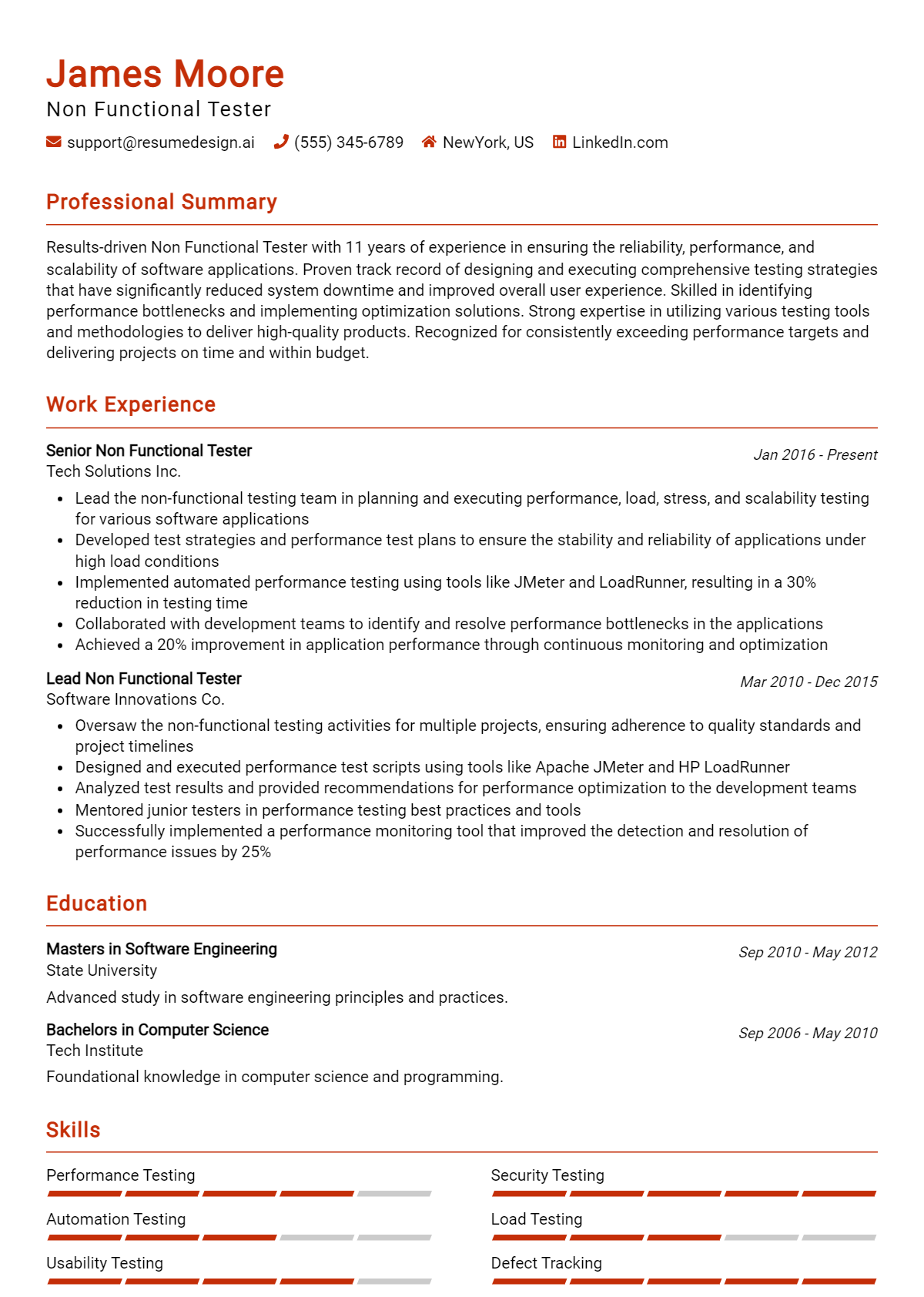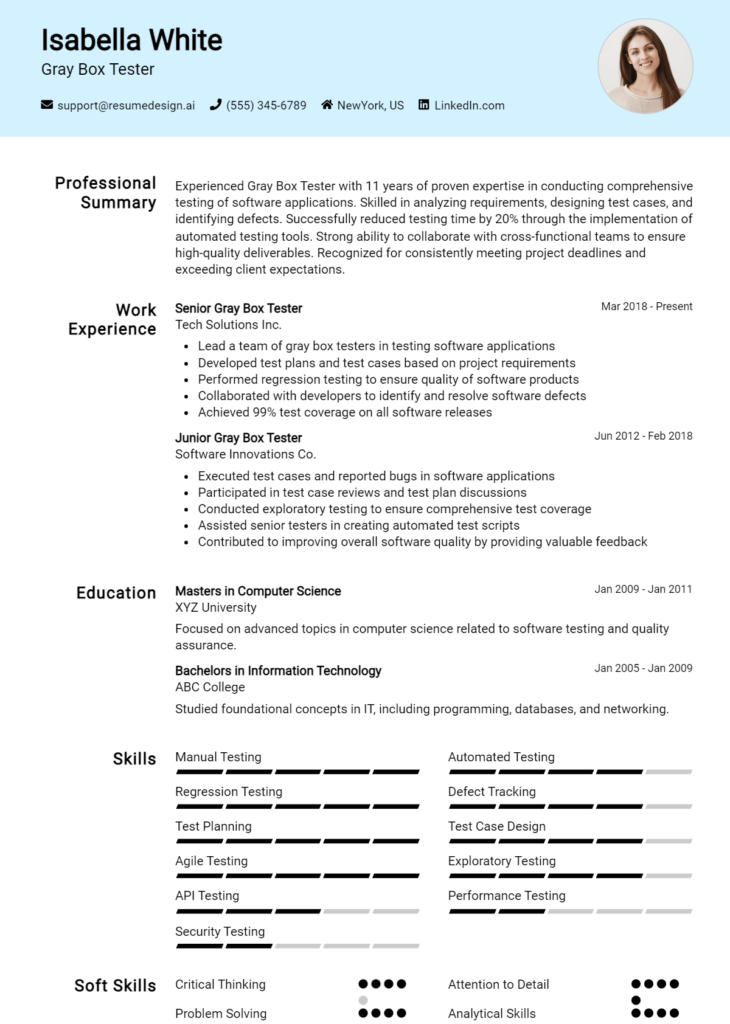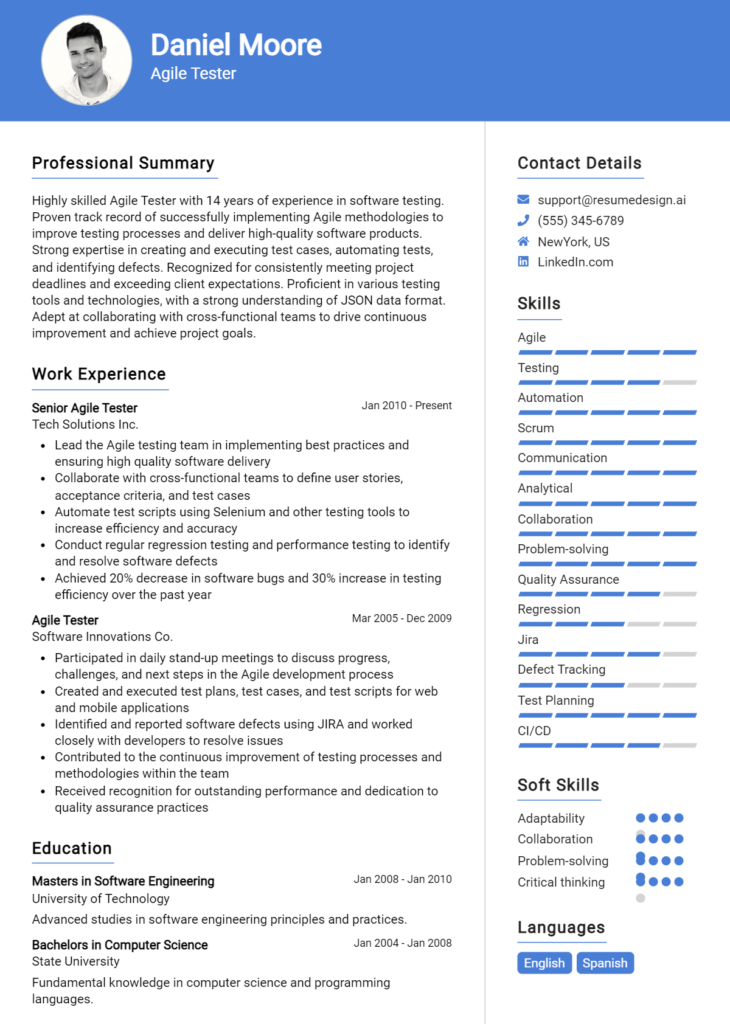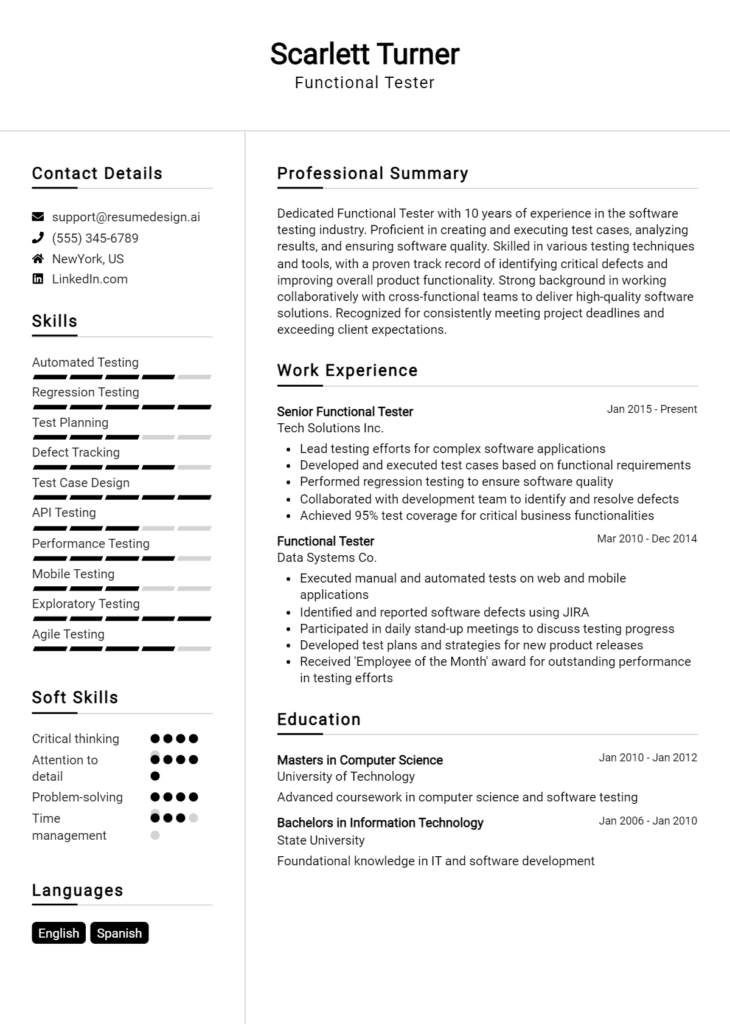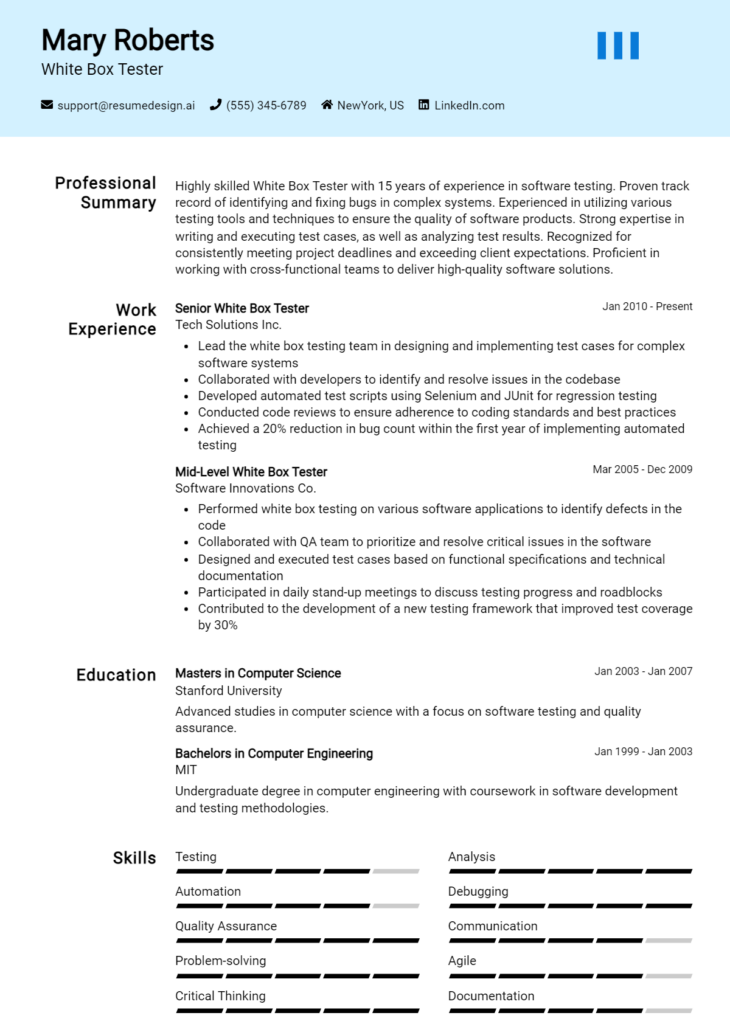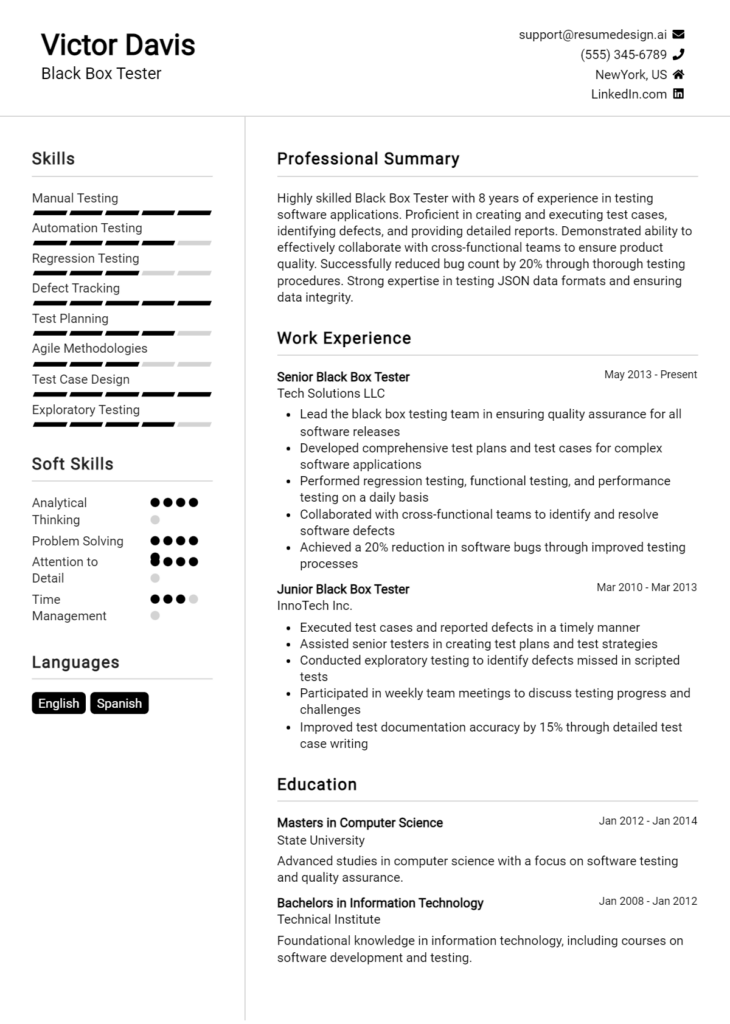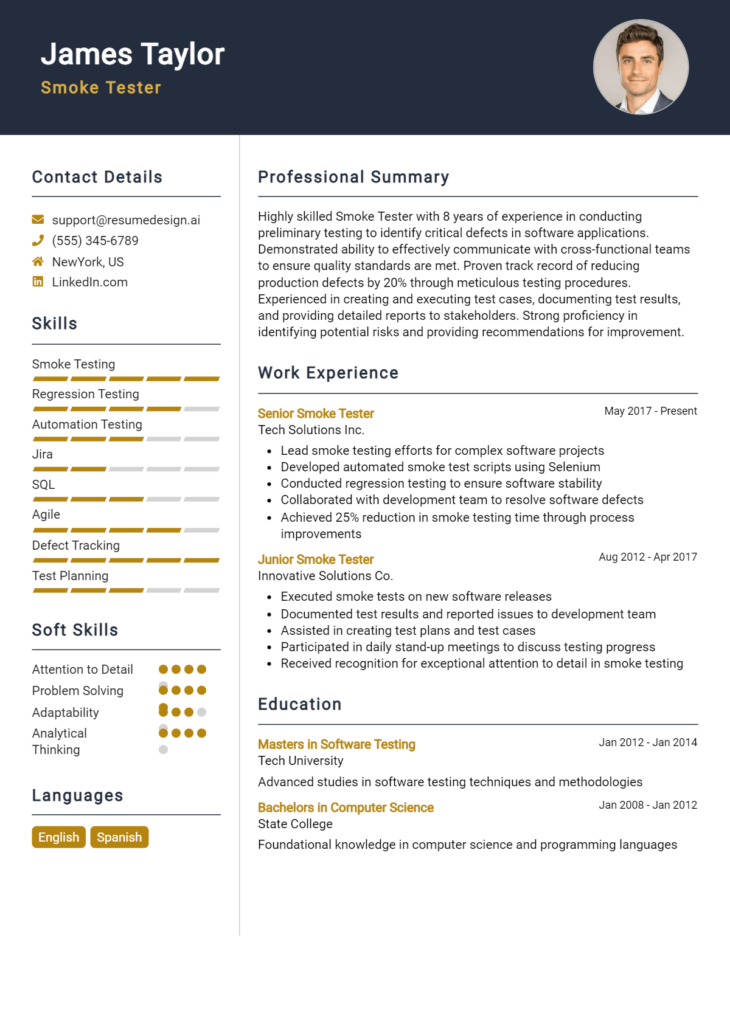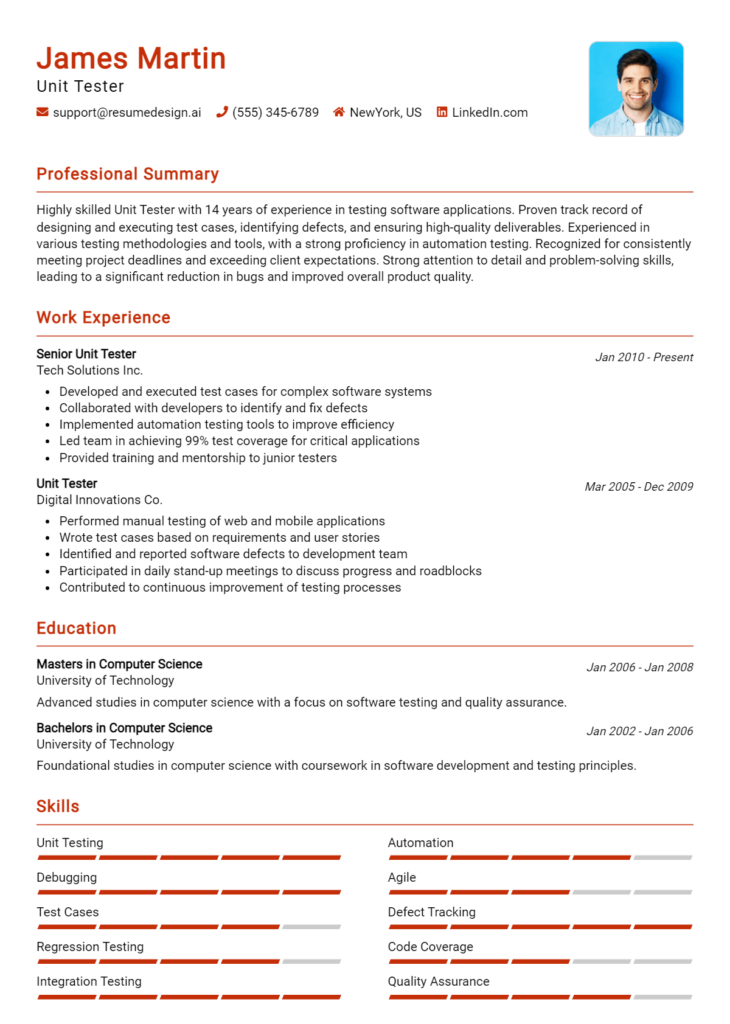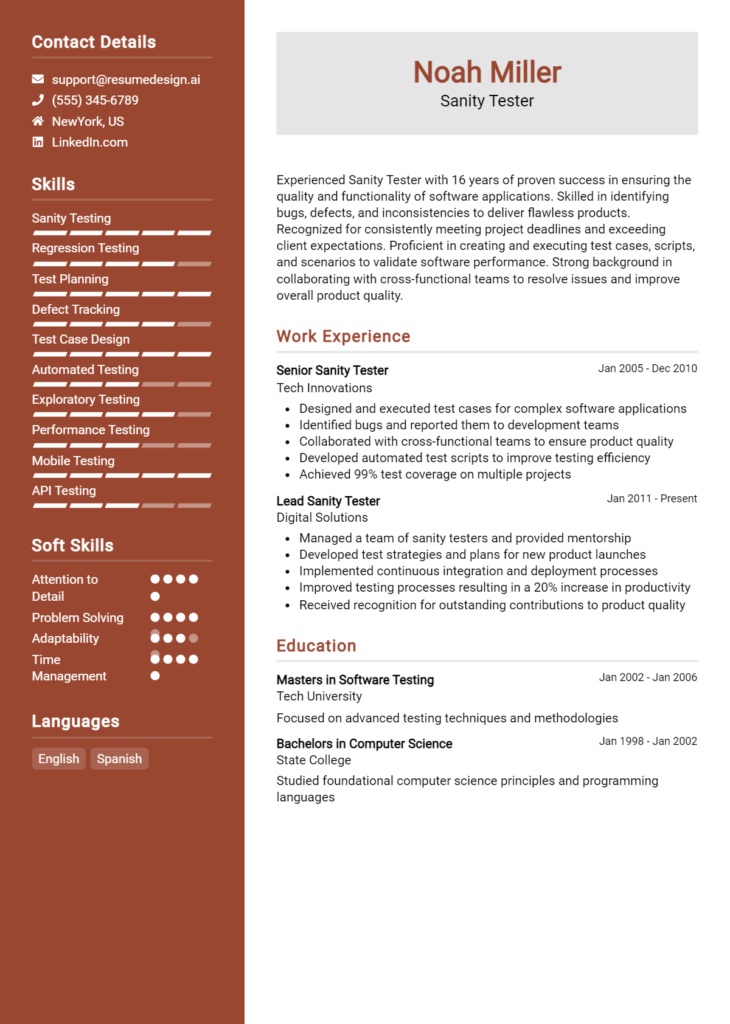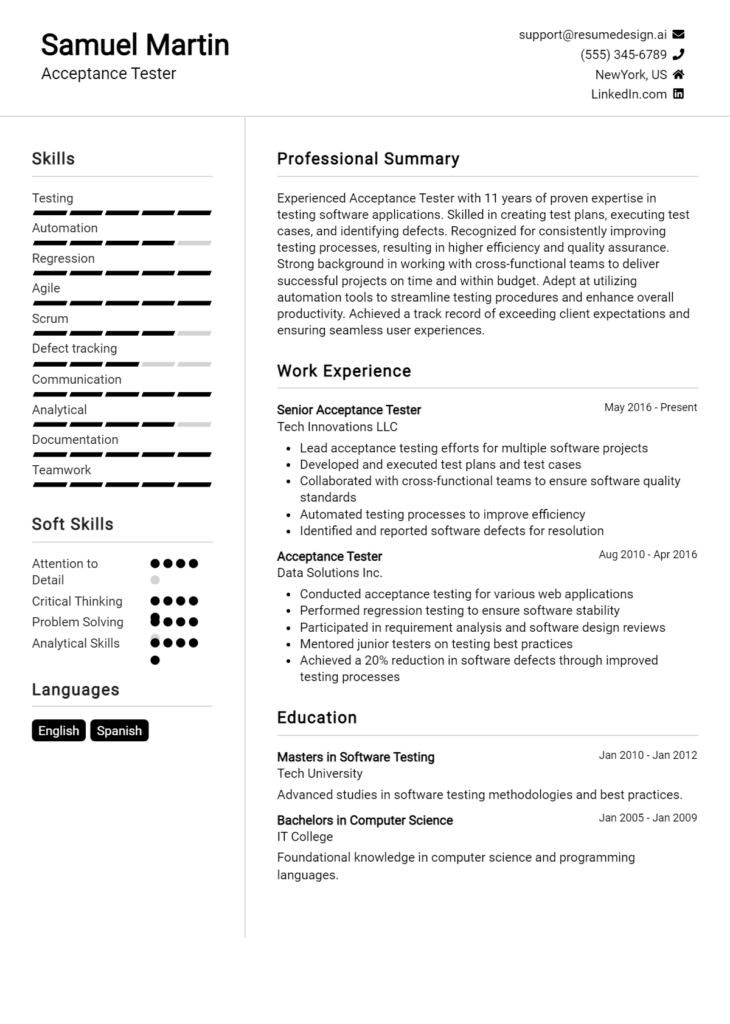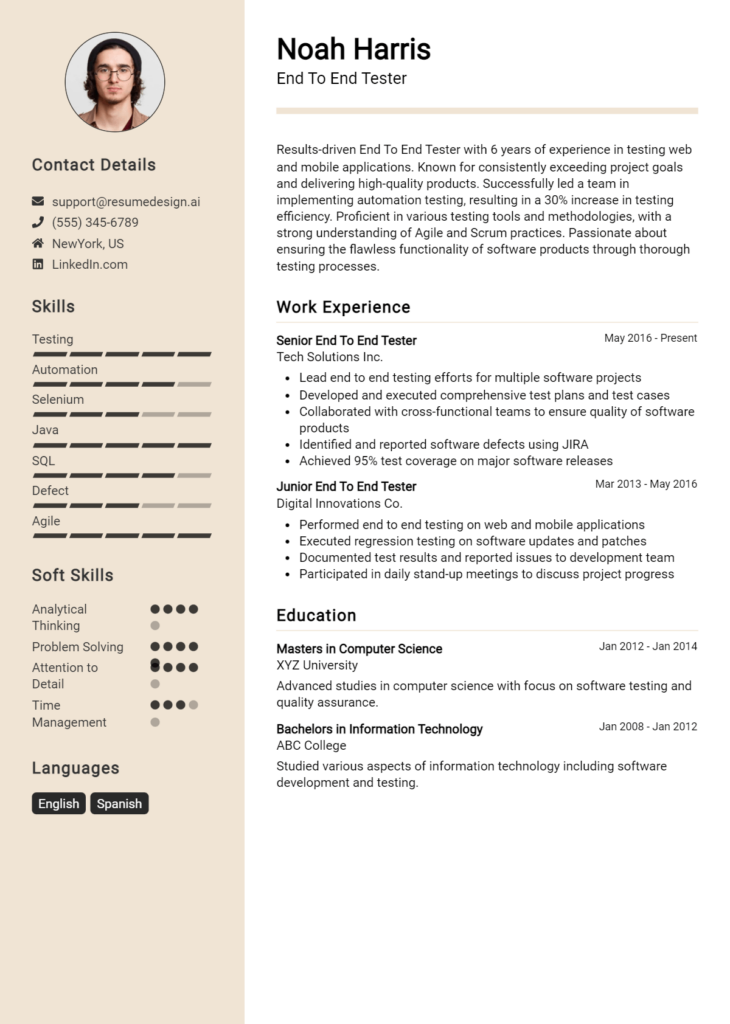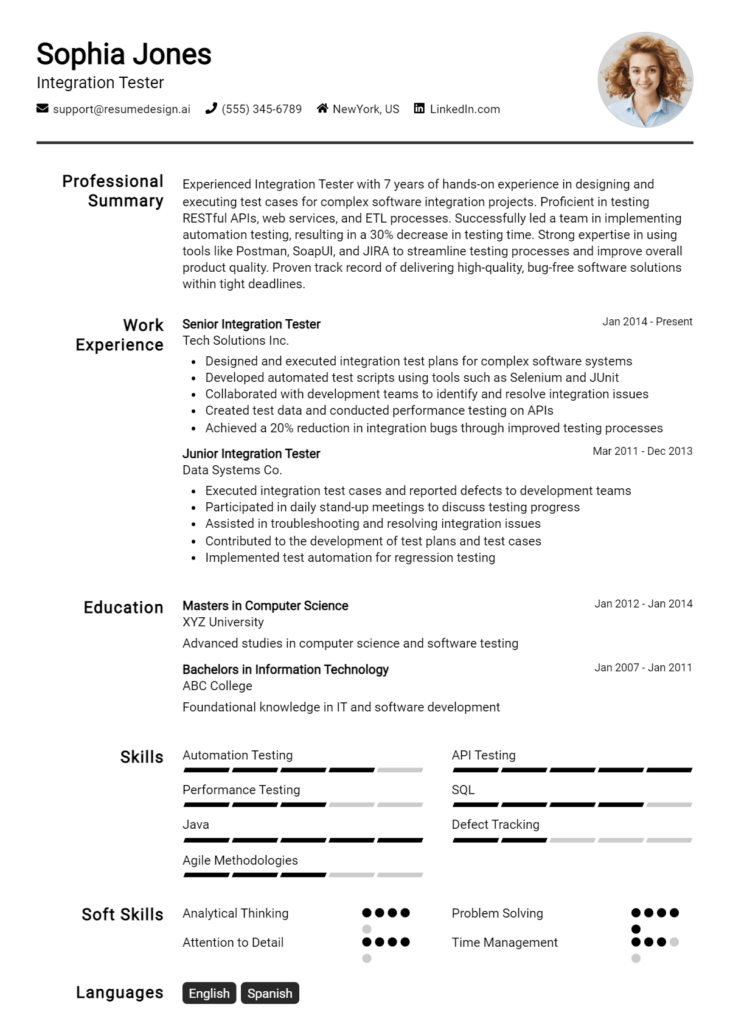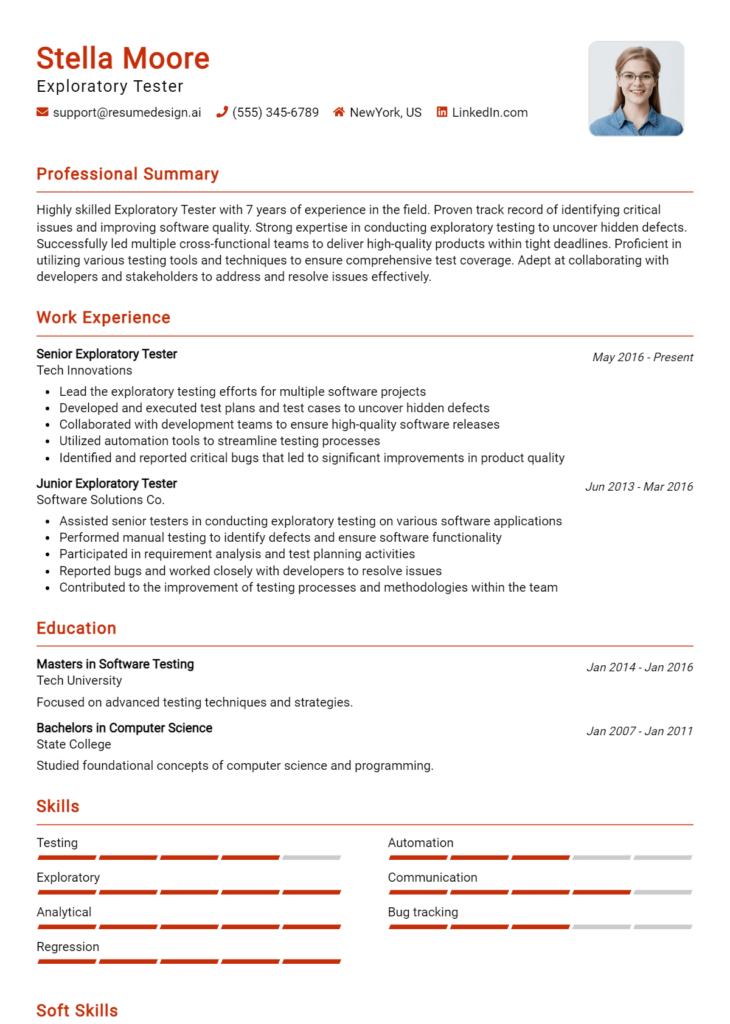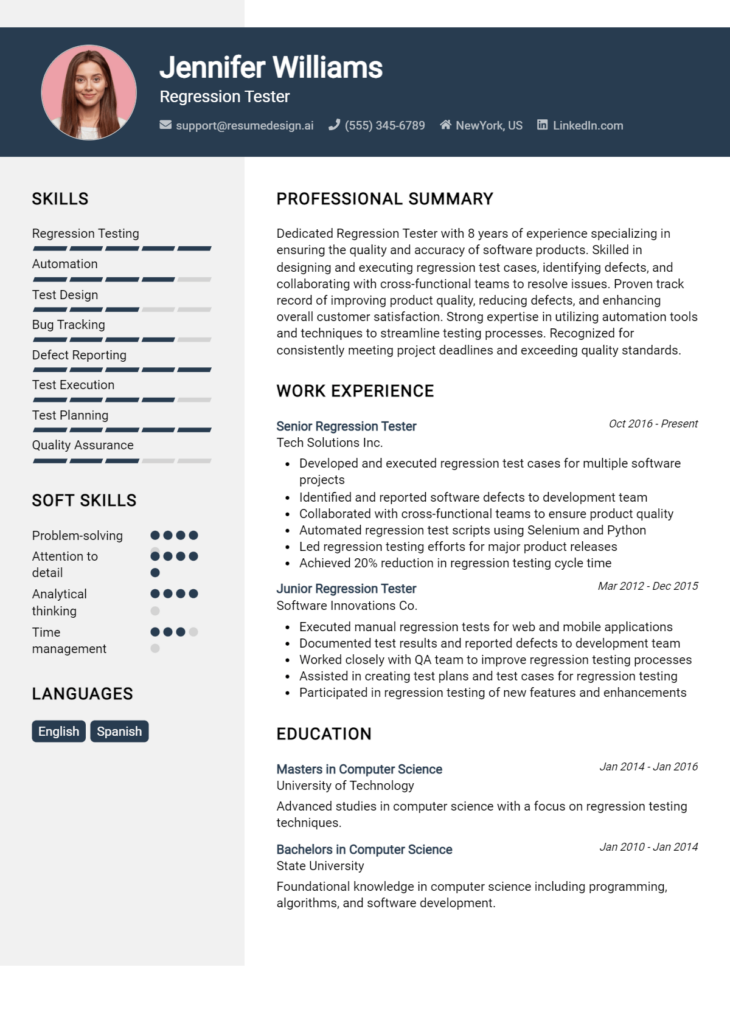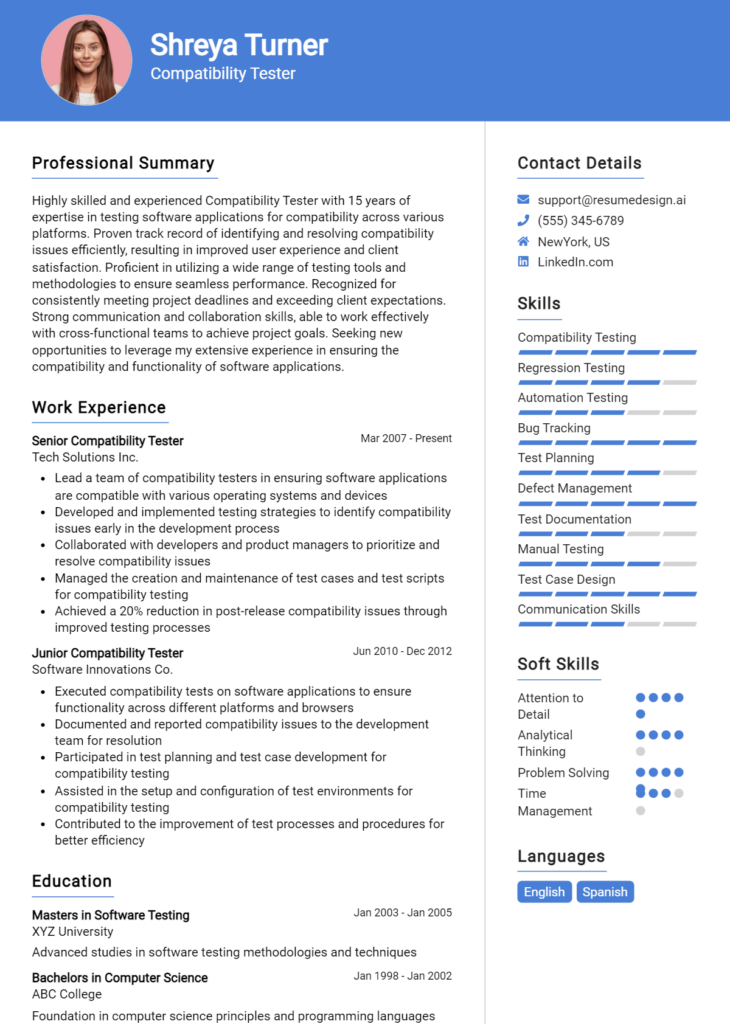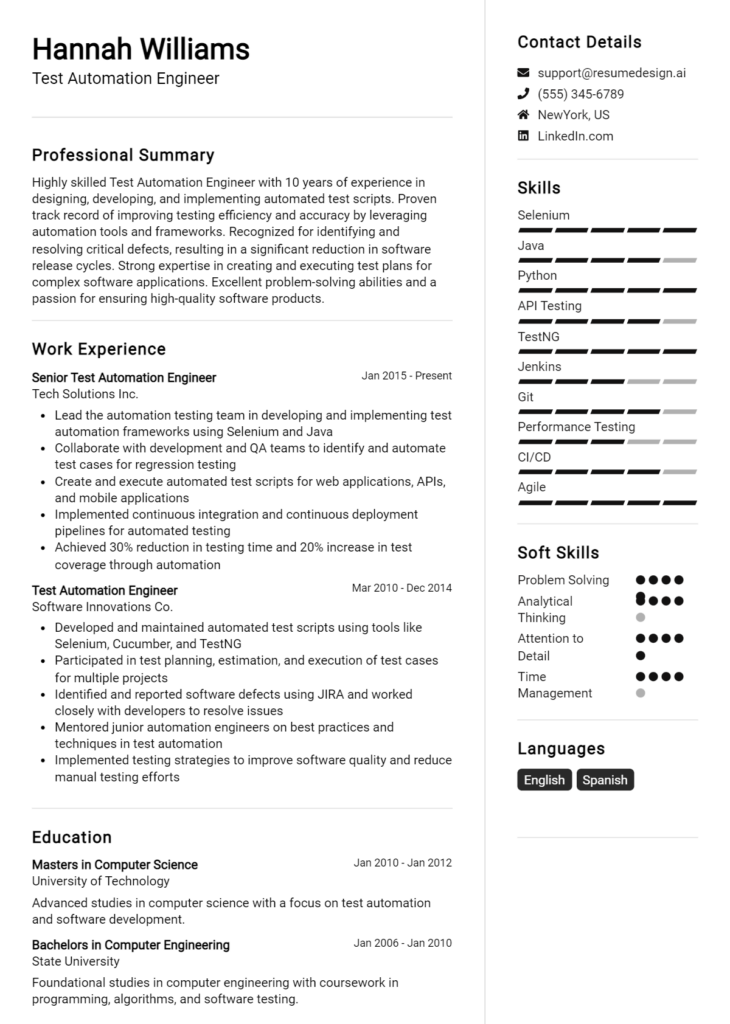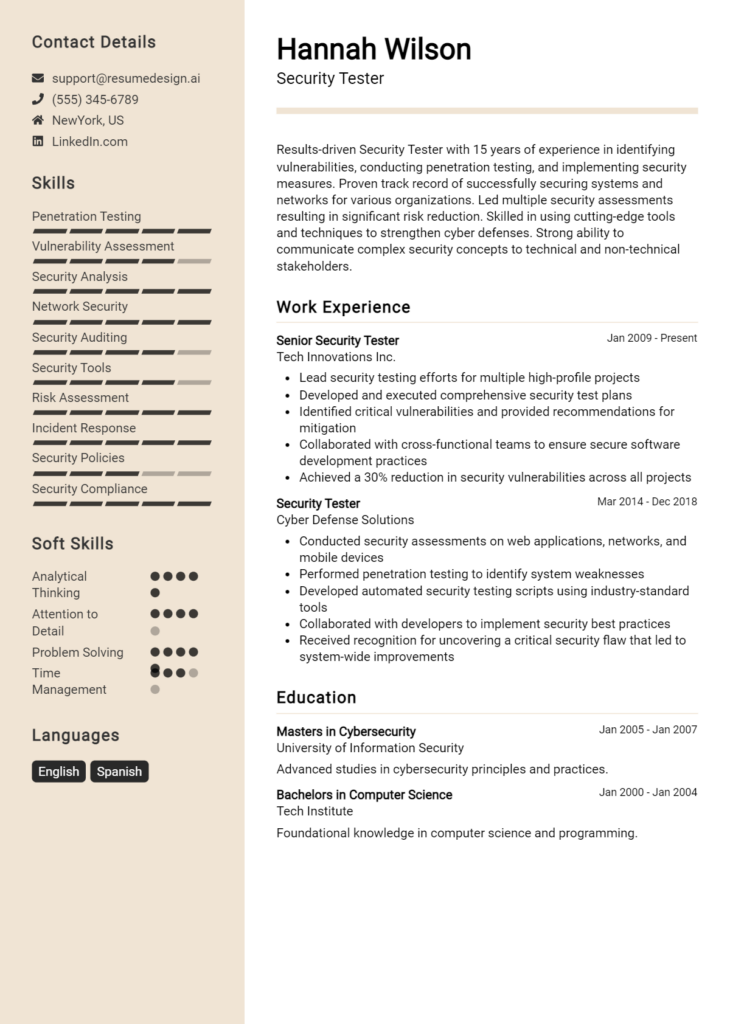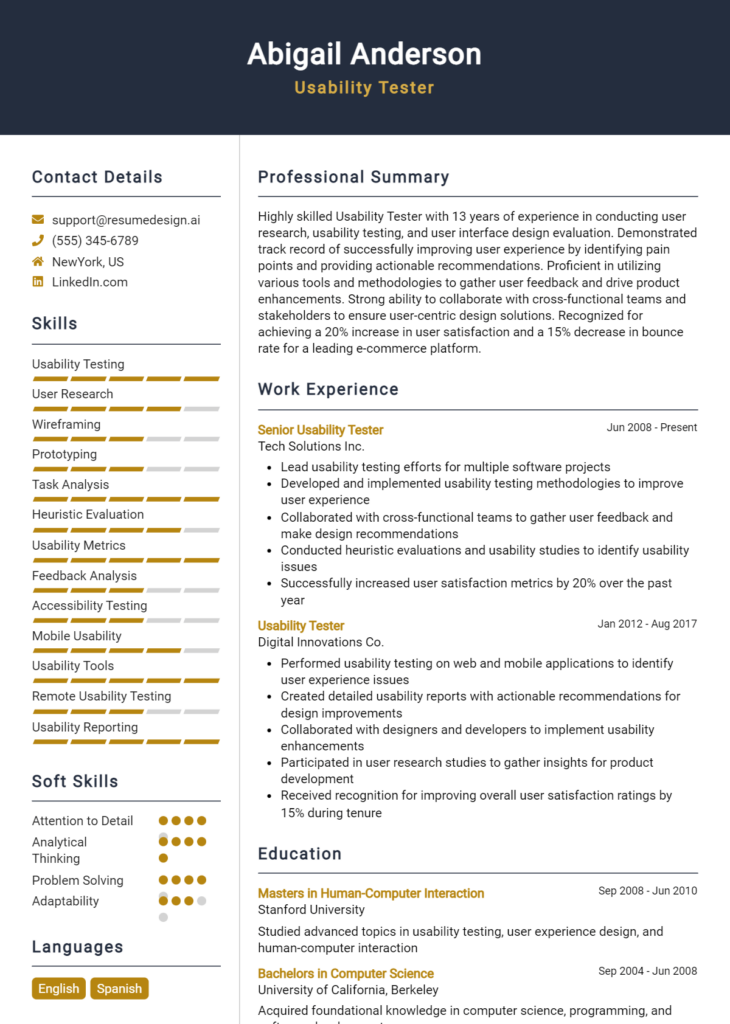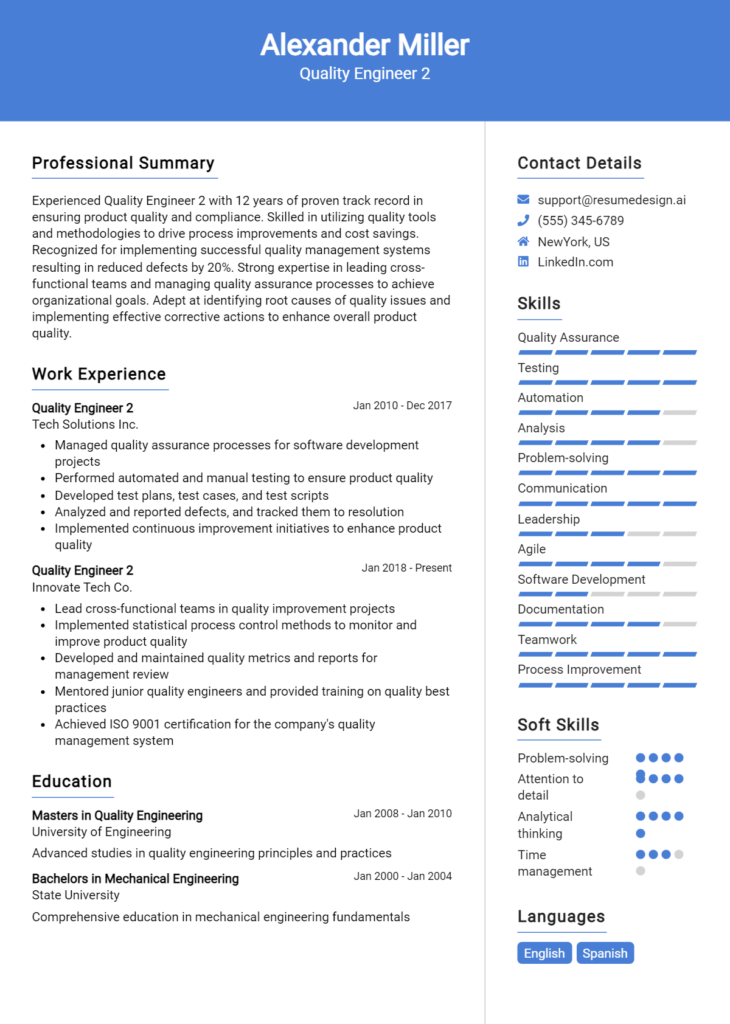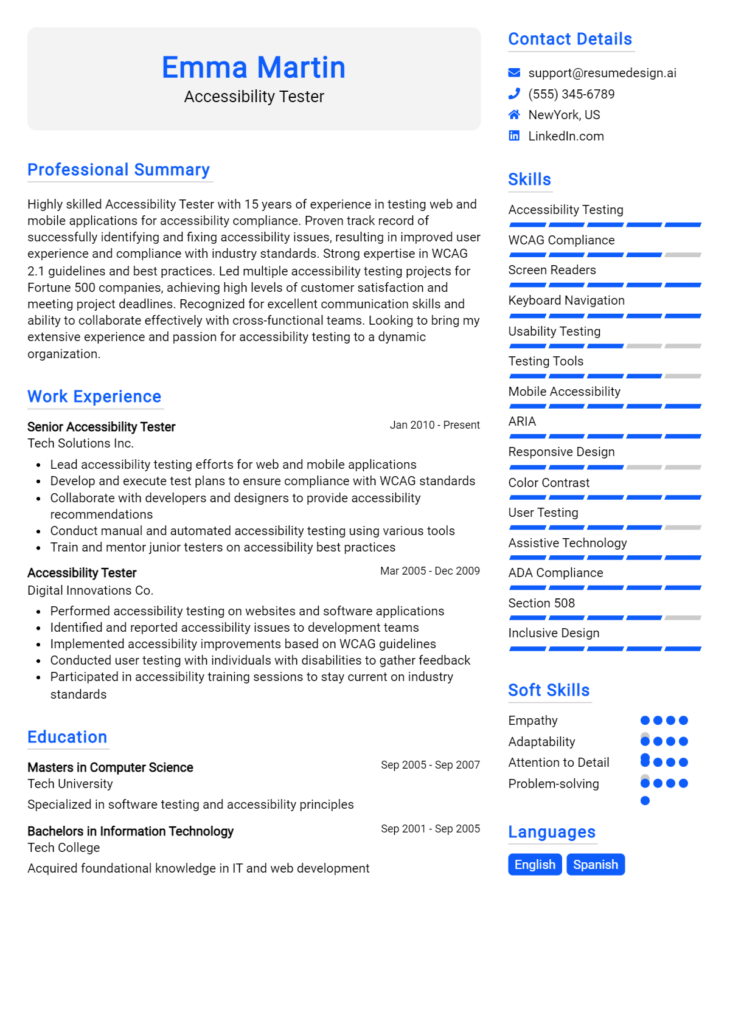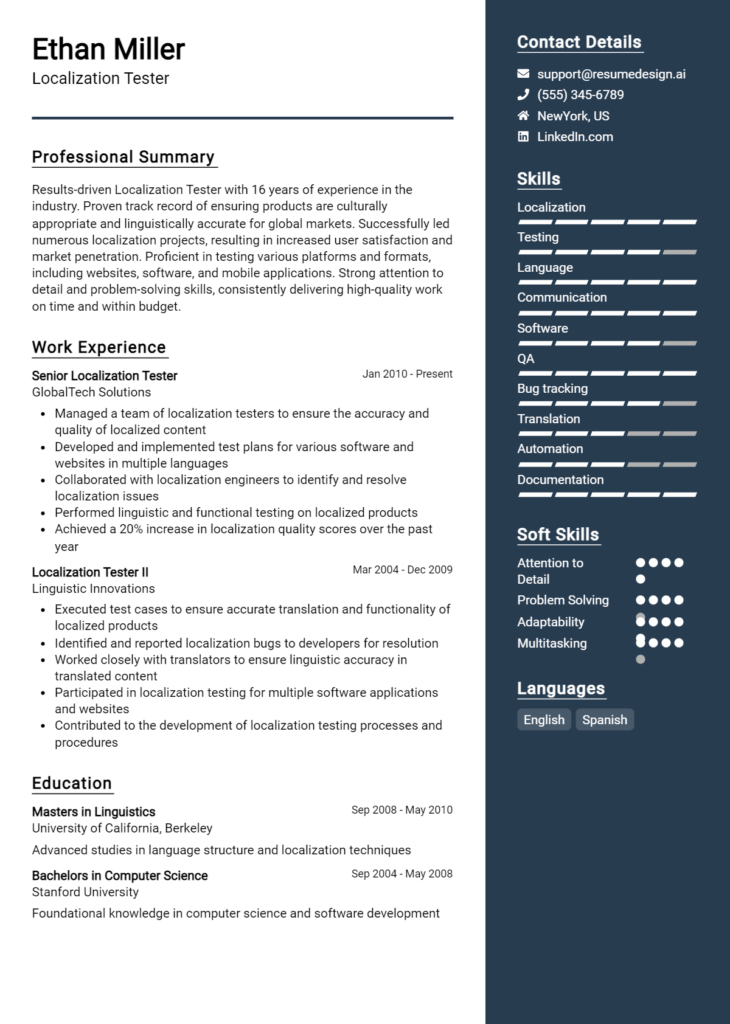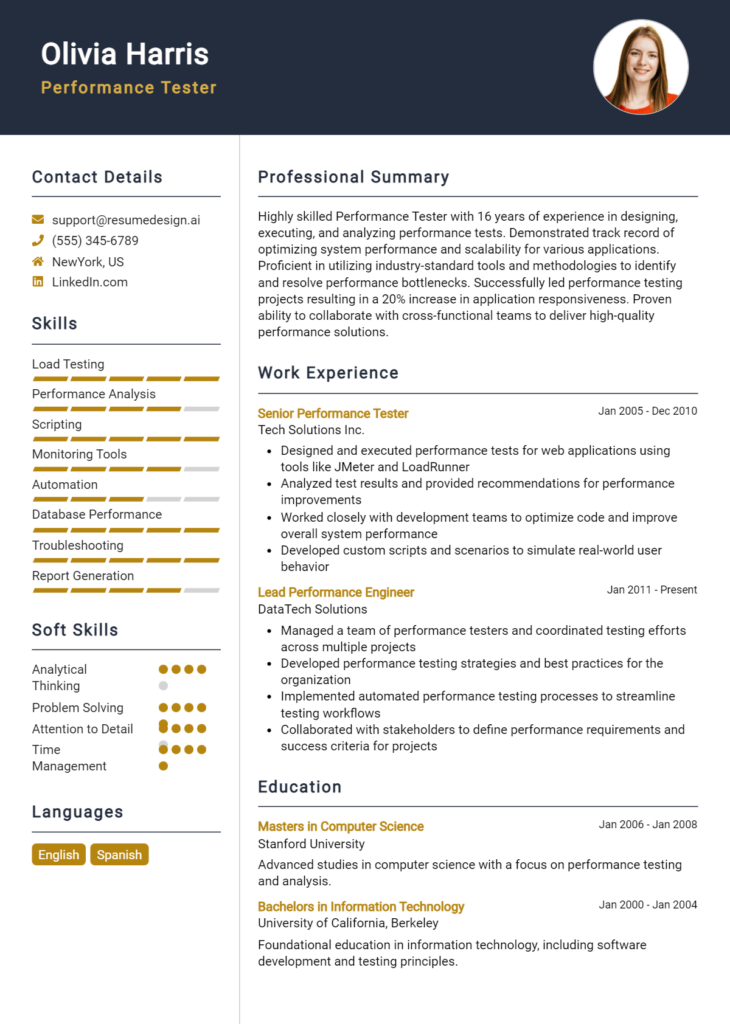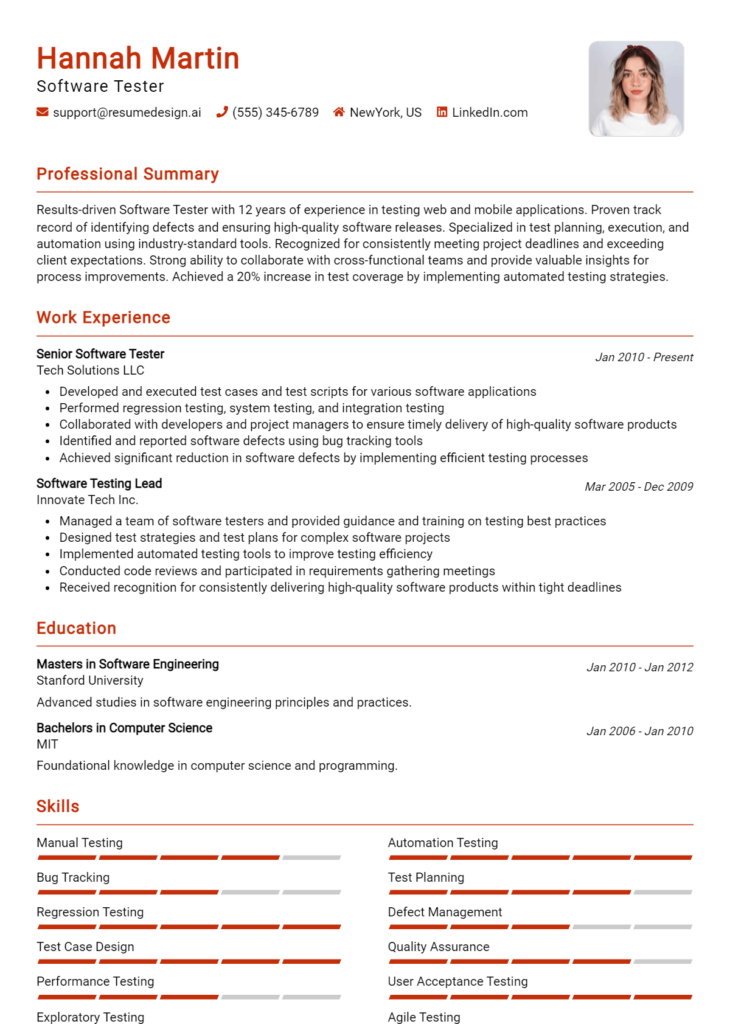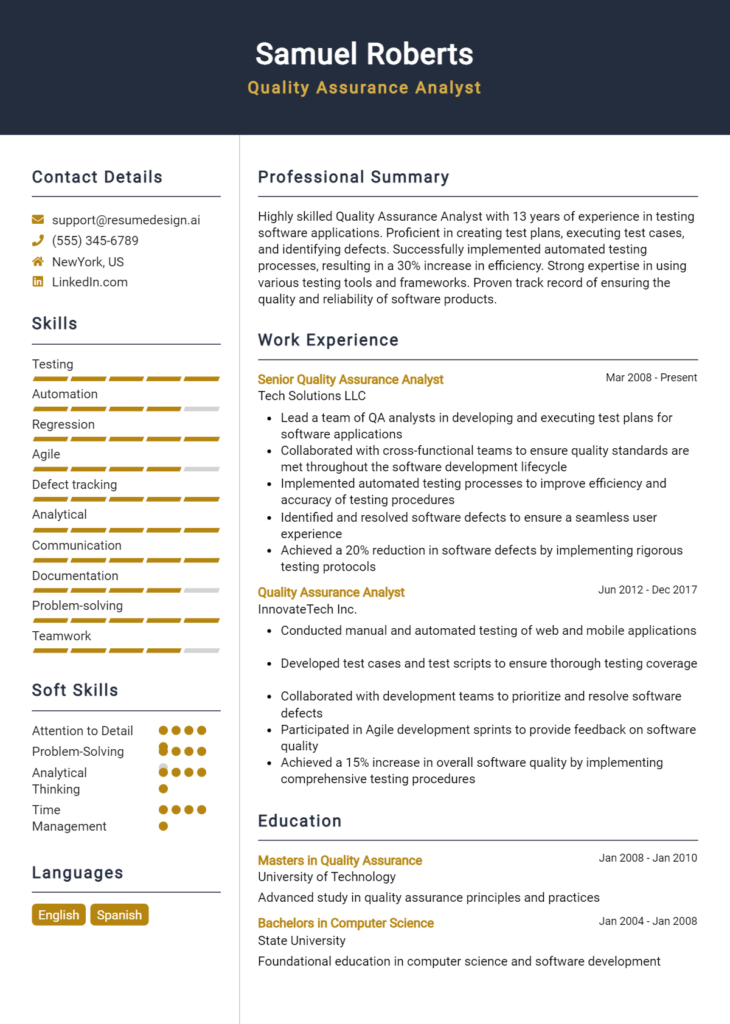Non-Functional Tester Core Responsibilities
A Non-Functional Tester plays a crucial role in ensuring that applications meet performance, security, and usability standards. This professional collaborates with development, operations, and quality assurance teams, requiring strong technical knowledge, operational insight, and exceptional problem-solving skills. By effectively assessing non-functional requirements, they contribute to the organization’s overall goals, ensuring seamless user experiences and system reliability. A well-structured resume highlighting these competencies can significantly enhance job prospects in this competitive field.
Common Responsibilities Listed on Non-Functional Tester Resume
- Design and execute non-functional test cases for performance, security, and usability.
- Conduct load, stress, and scalability testing to evaluate system behavior under various conditions.
- Collaborate with developers and business analysts to clarify non-functional requirements.
- Analyze test results and generate detailed reports for stakeholders.
- Identify performance bottlenecks and recommend solutions for improvement.
- Ensure compliance with industry standards and best practices in testing.
- Utilize testing tools and frameworks to automate non-functional tests.
- Participate in requirement reviews and provide feedback on non-functional aspects.
- Conduct security testing to identify vulnerabilities in applications.
- Monitor application performance in production and gather metrics for analysis.
- Train and mentor junior testing staff on non-functional testing methodologies.
- Stay updated on emerging trends and technologies in non-functional testing.
High-Level Resume Tips for Non-Functional Tester Professionals
In today's competitive job market, a well-crafted resume is essential for Non-Functional Tester professionals looking to make a strong first impression. Your resume is often the first glimpse a potential employer has of your skills, achievements, and overall fit for the role. It should not only reflect your technical abilities and domain knowledge but also showcase the impact you've made in your previous positions. This guide will provide practical and actionable resume tips specifically tailored for Non-Functional Tester professionals, ensuring that your application stands out in a crowded field.
Top Resume Tips for Non-Functional Tester Professionals
- Tailor your resume to the specific job description, using keywords that align with the requirements.
- Highlight relevant experience in performance testing, security testing, and usability testing to showcase your expertise.
- Quantify your achievements by including metrics that demonstrate your impact, such as reduced load times or improved system performance.
- Include industry-specific skills such as familiarity with tools like JMeter, LoadRunner, or Selenium.
- Emphasize your understanding of testing methodologies and frameworks relevant to non-functional testing.
- Showcase your ability to work collaboratively with development teams to ensure quality assurance processes are integrated.
- Highlight certifications related to testing, such as ISTQB or specialized non-functional testing credentials.
- Use a clear and concise format that is easy to read, with bullet points and sections that enhance readability.
- Incorporate a summary statement that encapsulates your experience and what you bring to the table as a Non-Functional Tester.
By implementing these tips, you can significantly increase your chances of landing a job in the Non-Functional Tester field. A targeted and well-structured resume will not only highlight your qualifications but also demonstrate your professionalism and attention to detail, making you an attractive candidate for potential employers.
Why Resume Headlines & Titles are Important for Non-Functional Tester
In the competitive field of software testing, a Non-Functional Tester plays a crucial role in ensuring that applications meet performance, usability, and security standards. Given the importance of this position, the way candidates present themselves on their resumes can significantly impact their chances of landing an interview. A well-crafted resume headline or title serves as the first impression, instantly grabbing the attention of hiring managers and summarizing a candidate's key qualifications in just a few impactful words. It should be concise, relevant, and directly related to the non-functional testing role, effectively showcasing the candidate's unique value proposition and setting the tone for the rest of their resume.
Best Practices for Crafting Resume Headlines for Non-Functional Tester
- Keep it concise and to the point, ideally under 10 words.
- Use industry-specific keywords that reflect the job description.
- Highlight your most relevant skills or experiences.
- Be specific about your area of expertise, such as performance testing or security testing.
- Avoid generic phrases; instead, tailor your headline for each job application.
- Incorporate measurable achievements when possible.
- Use strong action verbs to convey your contributions and capabilities.
- Ensure clarity and readability, avoiding jargon that may confuse the reader.
Example Resume Headlines for Non-Functional Tester
Strong Resume Headlines
"Performance Testing Specialist with 5+ Years of Experience"
"Expert in Load and Stress Testing for High-Traffic Applications"
“Security Testing Professional Focused on Vulnerability Assessment”
“Quality Assurance Analyst Specializing in Usability and Accessibility Testing”
Weak Resume Headlines
“Tester Looking for Opportunities”
“Experienced Professional”
Strong resume headlines are effective because they immediately convey essential information about the candidate's skills, experience, and suitability for the role, making a memorable impression on hiring managers. In contrast, weak headlines fail to impress due to their vagueness and lack of specificity, leaving employers with little insight into the candidate's qualifications. By focusing on impactful and tailored headlines, candidates can significantly enhance their chances of standing out in a crowded job market.
Writing an Exceptional Non-Functional Tester Resume Summary
A well-crafted resume summary is crucial for a Non-Functional Tester as it serves as the first impression for hiring managers. This brief yet powerful statement quickly communicates the applicant's key skills, relevant experience, and notable accomplishments within the realm of non-functional testing. A strong summary not only captures attention but also sets the tone for the rest of the resume, illustrating why the candidate is a perfect fit for the position. It should be concise, impactful, and tailored specifically to the job being applied for, ensuring that it resonates with the employer's needs and expectations.
Best Practices for Writing a Non-Functional Tester Resume Summary
- Quantify achievements: Use numbers and metrics to demonstrate the impact of your work.
- Focus on relevant skills: Highlight specific non-functional testing skills, such as performance testing, load testing, or security testing.
- Tailor the summary: Customize your summary to align with the job description and the skills that the employer is seeking.
- Keep it concise: Aim for 2-4 sentences that can be easily read and understood at a glance.
- Use action verbs: Start sentences with strong action verbs to convey confidence and initiative.
- Showcase technical proficiency: Mention relevant tools and technologies used in non-functional testing.
- Highlight industry experience: Indicate experience in specific industries if applicable, as it may align with the employer’s focus.
- Reflect passion for quality: Convey a commitment to ensuring high standards in software performance and usability.
Example Non-Functional Tester Resume Summaries
Strong Resume Summaries
Detail-oriented Non-Functional Tester with over 5 years of experience in performance and load testing for e-commerce applications, resulting in a 30% increase in site reliability. Proficient in using JMeter and LoadRunner, demonstrating a strong ability to identify bottlenecks and improve user experience.
Results-driven Non-Functional Tester with a proven track record of reducing application response times by 25% through comprehensive stress testing. Skilled in utilizing automated testing tools like Selenium and Apache JMeter to enhance software quality and performance.
Dedicated Non-Functional Tester with expertise in security and usability testing, contributing to a 40% decrease in security vulnerabilities in web applications. Adept at employing OWASP guidelines and automated testing frameworks to ensure robust application performance.
Weak Resume Summaries
Experienced tester with a background in software quality assurance. Interested in working in non-functional testing.
Non-Functional Tester who has worked on various projects. Looking for a new opportunity in the industry.
The examples provided illustrate the stark contrast between strong and weak resume summaries. Strong summaries effectively quantify achievements, highlight relevant skills, and demonstrate a clear alignment with the non-functional testing role. In contrast, weak summaries lack specificity, fail to showcase measurable outcomes, and come off as generic, making it difficult for hiring managers to see the candidate's unique value.
Work Experience Section for Non-Functional Tester Resume
The work experience section of a Non-Functional Tester resume is critical in demonstrating a candidate's proficiency in testing and quality assurance methodologies. This section allows job seekers to showcase their technical skills, leadership capabilities, and the ability to manage teams effectively while delivering high-quality products. It is essential to quantify achievements and align the experience with industry standards, as this not only highlights the candidate's contributions but also enhances their credibility in the eyes of potential employers.
Best Practices for Non-Functional Tester Work Experience
- Highlight specific non-functional testing methodologies employed (e.g., performance, security, usability).
- Quantify results achieved through testing efforts (e.g., reduced load times by 30%, improved security vulnerabilities detection rate).
- Showcase collaboration with cross-functional teams, including developers, product managers, and stakeholders.
- Detail leadership roles taken in projects, such as mentoring junior testers or leading testing initiatives.
- Include relevant tools and technologies used, demonstrating technical expertise (e.g., JMeter, LoadRunner, Selenium).
- Align experience descriptions with industry standards and best practices in quality assurance.
- Focus on impact-driven results, emphasizing how testing contributed to overall project success.
- Tailor the work experience to match the specific job description for the role being applied for.
Example Work Experiences for Non-Functional Tester
Strong Experiences
- Led a performance testing initiative that resulted in a 40% improvement in application response time, significantly enhancing user satisfaction.
- Implemented a security testing framework which identified and mitigated 95% of critical vulnerabilities prior to product launch, ensuring compliance with industry standards.
- Collaborated with a team of developers and product managers to design and execute comprehensive usability tests, improving user interface ratings by 25% based on user feedback.
- Managed a team of 5 testers during a critical project phase, facilitating knowledge sharing sessions that increased test coverage by 30%.
Weak Experiences
- Performed testing on various applications without specifying methodologies or results.
- Worked with a team to complete testing tasks, but did not indicate any specific contributions or achievements.
- Assisted in testing processes without detailing the impact or outcomes of these efforts.
- Conducted non-functional testing as part of my job responsibilities, but failed to mention any tools or methods used.
The examples labeled as "strong" demonstrate clear, quantifiable outcomes and specific contributions to projects, reflecting a candidate's effectiveness and technical leadership. In contrast, the "weak" examples lack detail and measurable results, making them less impactful and failing to convey the candidate's true capabilities or achievements in non-functional testing.
Education and Certifications Section for Non-Functional Tester Resume
The education and certifications section of a Non-Functional Tester resume plays a crucial role in showcasing a candidate's academic foundation and commitment to professional development. This section not only highlights the candidate's formal education but also underscores their industry-relevant certifications and continuous learning efforts. By providing details on relevant coursework, certifications, and any specialized training, candidates can significantly enhance their credibility and demonstrate alignment with the job requirements, ultimately increasing their chances of standing out in a competitive job market.
Best Practices for Non-Functional Tester Education and Certifications
- Focus on relevant degrees such as Computer Science, Information Technology, or Software Engineering.
- List industry-recognized certifications like ISTQB, AWS Certified Solutions Architect, or Performance Testing certifications.
- Include specific coursework that pertains to non-functional testing, such as performance testing, security testing, and load testing.
- Prioritize certifications that demonstrate ongoing education and mastery of testing tools and methodologies.
- Highlight any specialized training or workshops attended that relate to non-functional testing practices.
- Use clear and concise language to describe educational achievements and certifications.
- Consider the relevance of the education and certifications to the specific job role being applied for.
- Keep the section updated with the latest credentials and courses completed to reflect continuous learning.
Example Education and Certifications for Non-Functional Tester
Strong Examples
- Bachelor of Science in Computer Science, XYZ University
- Certified Software Tester (CSTE) from Quality Assurance Institute
- Performance Testing with JMeter - Online Course Completion Certificate
- ISTQB Foundation Level Certification in Software Testing
Weak Examples
- Associate Degree in Arts from ABC Community College
- Certified Ethical Hacker (CEH) - Not relevant for non-functional testing
- Basic Computer Skills Certificate - Lacks relevance to testing
- Outdated certification in Manual Testing (2005)
The examples presented demonstrate a clear distinction between strong and weak qualifications. Strong examples are directly relevant to the role of a Non-Functional Tester, reflecting both appropriate academic credentials and certifications that are recognized in the industry. In contrast, weak examples often highlight irrelevant degrees or outdated certifications that do not align with the requirements of non-functional testing, thereby diminishing the candidate's appeal to potential employers.
Top Skills & Keywords for Non-Functional Tester Resume
As a Non-Functional Tester, possessing the right skills is crucial for effectively evaluating the performance, usability, security, and reliability of software applications. These skills not only demonstrate a candidate's technical proficiency but also highlight their ability to contribute to the overall quality of the product. A well-crafted resume that emphasizes relevant skills can significantly enhance a candidate's chances of securing an interview, as it showcases their understanding of the non-functional testing landscape. By focusing on both hard and soft skills, applicants can convey their capability to adapt to various challenges in the testing environment and collaborate effectively with cross-functional teams.
Top Hard & Soft Skills for Non-Functional Tester
Soft Skills
- Analytical Thinking
- Attention to Detail
- Problem-Solving
- Communication Skills
- Team Collaboration
- Time Management
- Adaptability
- Critical Thinking
- Creativity
- Conflict Resolution
- Empathy
- Continuous Learning
- Customer Focus
- Proactive Mindset
Hard Skills
- Performance Testing Tools (e.g., JMeter, LoadRunner)
- Security Testing Techniques
- Usability Testing Methodologies
- API Testing
- Test Automation Frameworks
- SQL and Database Management
- Knowledge of Software Development Life Cycle (SDLC)
- Scripting Languages (e.g., Python, JavaScript)
- Test Case Design and Execution
- Familiarity with Agile and DevOps Practices
- Defect Tracking and Management Tools (e.g., JIRA)
- Network Protocols and Analysis
- Load and Stress Testing
- Web Application Testing
- Mobile Application Testing
- Cloud Testing Knowledge
For more insights on how to effectively showcase your skills and work experience, consider tailoring your resume to reflect both your technical expertise and your interpersonal strengths.
Stand Out with a Winning Non-Functional Tester Cover Letter
Dear Hiring Manager,
I am excited to apply for the Non-Functional Tester position at [Company Name] as advertised on [where you found the job listing]. With a strong background in software testing and a keen focus on performance, security, and usability, I am confident in my ability to contribute effectively to your team. My experience has equipped me with the skills necessary to ensure that applications not only meet functional requirements but also deliver an exceptional user experience under various conditions.
In my previous role at [Previous Company], I was responsible for conducting thorough non-functional testing across multiple projects, utilizing tools such as JMeter and LoadRunner to assess application performance under heavy load. I collaborated closely with development teams to identify potential bottlenecks and implemented testing strategies that improved application responsiveness by over 30%. Additionally, I performed security testing using OWASP guidelines, which helped to enhance the application’s resilience against potential threats.
I am particularly drawn to this opportunity at [Company Name] because of your commitment to innovation and quality. I admire how your team values the importance of robust non-functional testing to ensure that products not only meet client specifications but also exceed user expectations. I am eager to bring my expertise in test automation and performance analysis to contribute to your mission and help deliver outstanding software solutions.
Thank you for considering my application. I look forward to the opportunity to discuss how my skills and experiences align with the needs of your team. Please feel free to contact me at [Your Phone Number] or [Your Email Address] to arrange a conversation.
Sincerely,
[Your Name]
Common Mistakes to Avoid in a Non-Functional Tester Resume
When crafting a resume for a Non-Functional Tester position, it's crucial to present your skills and experience effectively to stand out to potential employers. However, many candidates make common mistakes that can detract from their qualifications. Understanding these pitfalls can help you create a compelling resume that highlights your strengths and aligns with the expectations of hiring managers in the field.
Lack of Specificity: Failing to provide specific details about your testing experience can make your resume vague. It's essential to highlight particular tools, methodologies, and types of non-functional testing you have performed, such as performance, security, or usability testing.
Ignoring Relevant Skills: Non-Functional Testing requires a unique set of skills, including knowledge of performance testing tools like JMeter or LoadRunner. Omitting these can suggest a lack of expertise in the area.
Not Quantifying Achievements: When listing your accomplishments, avoid generic statements. Instead, quantify your achievements with metrics, such as “improved system performance by 30%” or “reduced load time by 50%.”
Using an Irrelevant Format: A cluttered or overly complicated resume format can detract from your qualifications. Stick to a clean, professional layout that emphasizes readability and organizes your information logically.
Neglecting Continuous Learning: The field of non-functional testing is constantly evolving. Failing to mention relevant certifications, workshops, or ongoing education can make it seem like you are not keeping up with industry trends.
Not Tailoring the Resume: Sending out a generic resume can diminish your chances of getting noticed. Tailor your resume for each job application by aligning your experience and skills with the specific requirements listed in the job description.
Overlooking Soft Skills: While technical skills are vital, neglecting to highlight soft skills such as communication, teamwork, and problem-solving can leave your resume feeling one-dimensional. Non-Functional Testers often collaborate with various teams, so demonstrating these abilities is essential.
Omitting Keywords: Many companies use Applicant Tracking Systems (ATS) to filter resumes. Not including industry-specific keywords and phrases can result in your resume being overlooked, so be sure to incorporate relevant terminology from the job description.
Conclusion
In summary, the role of a Non-Functional Tester is critical in ensuring that software applications not only function correctly but also meet performance, usability, security, and reliability standards. Throughout this article, we've highlighted the essential skills and responsibilities associated with non-functional testing, emphasizing the importance of tools and methodologies that support effective testing practices.
As you reflect on your career as a Non-Functional Tester, consider the effectiveness of your resume in showcasing your qualifications and experience. It's essential to present your skills clearly and compellingly to stand out in a competitive job market.
We encourage you to take action today by reviewing and updating your Non-Functional Tester resume. To assist you in this process, we recommend utilizing the various resources available:
- Explore resume templates that can provide a professional layout.
- Use the resume builder to easily create a polished resume tailored to your experience.
- Check out resume examples for inspiration and ideas on how to present your skills effectively.
- Don't forget to craft a strong first impression with our cover letter templates that complement your resume.
Take the next step in advancing your career by ensuring your resume reflects the expertise and value you bring as a Non-Functional Tester!

